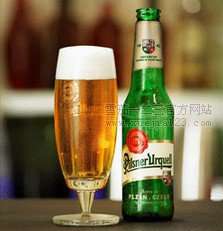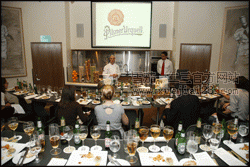Pilsner Urquell Pushes Beer and Food
 "White wine with fish, red wine with meat." It's the long-standing rule of thumb when deciding what beverage pairs best with a meal. Unfortunately, it doesn't consider any other alcoholic beverages worthy of drinking with food. Pilsner Urquell, the world's first Bavarian pilsner, is trying to debunk that notion.
"White wine with fish, red wine with meat." It's the long-standing rule of thumb when deciding what beverage pairs best with a meal. Unfortunately, it doesn't consider any other alcoholic beverages worthy of drinking with food. Pilsner Urquell, the world's first Bavarian pilsner, is trying to debunk that notion.
Wait a second. Is someone suggesting that beer pairs well with food? Oh the humanity, cries the wine cognoscente with a cringe.
The fact of the matter is that beer -- with its vast variety of styles and expressions -- does pair well with food and, as Pilsner Urquell believes, a quality brew has all the components and ingredients needed to complement a variety of dishes. With that belief, Pilsner Urquell is pushing the idea that when it comes to food, beer has just as much to offer as wine.
Sadly, though, beer suffers from a tainted reputation. It's often linked to uncouth frat boys, middle-aged softball players with oversized paunches and hard hats spending their lunch break at the local watering hole. Its association with food rarely goes beyond burgers, barbecue, Buffalo wings and washing down a few hot dogs at a ball game.
"There is a lack of education about beer as opposed to wine," says Ryan Johnson the U.S. trade brewer for Miller Brewing Co.'s international brands division, which includes Pilsner Urquell. "Wineries have stuck together as a team and together preach the intrinsic [qualities] of wine. With beer, there is a lot of competition between breweries and instead of pushing beer as a category, they only push their own brands."
 |
"Beer is not as specific as wine when it comes to pairing with food," says Johnson. "Sometimes with wine, it's either a perfect fit or a disaster. Beer is more forgiving." Johnson draws a parallel between wine and beer, noting that each offers an array of styles from an array of regions, each with its own inherent value and taste profile. "Most people order wine by style," he says. "People don't order beer by style, they order it by brand, and if a certain brand is not available, it becomes a difficult decision."
To counter this trend, Johnson stresses beer education, from the brewing process and the ingredients to the various styles offered and how to best enjoy those styles. For its part, Pilsner Urquell has created the Sensory Beer Experiment -- a pairing of gourmet food with Pilsner Urquell beer -- which made a stop in Manhattan last week at The French Culinary Institute.
 |
Like any tasting, pairing beer with food is a subjective experience. "It all comes down to what a person likes," says Johnson.
All three beers, with their light hoppy citrus notes, paired well with the salty richness of the tacos. With the shrimp, the carbonation in the beers provided a crisp, clean feeling on the palate, and with the jerk clam gratin, a pronounced fruit and pineapple note came through. Most surprising was how the beers paired with cheese, which is typically matched with wine. Not only did the combination produce a wonderful chewy texture in the mouth, but there were also loads of cream, melon and bread notes.
"Pilsner Urquell is trying to concentrate its efforts on finding pairings that will people away [from the perception that beer doesn't pair well with food]," says Johnson. "It's about focusing on why and how. We're giving the consumers a different approach. We're giving them something to talk about and something to argue."
The approach seems to be working for Pilsner Urquell. Those in attendance most certainly left with a new understanding of beer and food. Of course, there's plenty of research that can still be done with beer, including pairing it with premium cigars. But that's the fun part.

扫描微信,2014世界排名雪茄排名即将开启!
- 如何辨别假雪茄?
